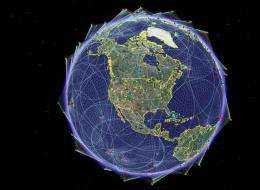January 2, 2012 report
Hackers plot DIY Sputniks for Internet freedom

(PhysOrg.com) -- Hackers at the Chaos Communication Congress in Berlin, which wrapped up over the weekend, are toasting the New Year with a newly announced plan for a hacker-owned satellite communications network. The anti-censorship allies want to counter the spate of legislative and government efforts that seek to interfere with Internet freedoms.
The new plan calls for sending up home-made satellites into space as part of a Hackerspace Global Grid. The project includes low-cost ground stations to track and communicate with the satellites.
Anti-censorship activist Nick Farr, bothered by the world’s threats in blocking the free flow of information, started campaigning for contributions to the Grid earlier this year.
Launching communications satellites has been attempted in the past by some amateur groups but low-budget projects have not easily managed the task of tracking the devices.
According to reports, a few small satellites have gone into orbit but usually for brief periods only. Initiatives like space missions have required the big pockets of large public agencies and private companies, but Farr hopes his plan can work.
Farr and colleagues envision a grid of low-cost ground stations to track and communicate with the satellites. They are working with Constellation, which is a German aerospace research initiative. The initiative interlinks student projects.
The Hackerspace Global Grid plans three prototype ground stations to be in place by the first half of this year.
Armin Bauer of Stuttgart is one of the enthusiasts working on the Hackerspace Global Grid and they are planning out the distributed network of these low-cost ground stations.
In their plan, the stations can be bought or built by individuals. The Grid team plans to sell the devices on a nonprofit basis for about 100 euros per ground station.
Bauer said that the team also hopes to give away some working models at the next Chaos Communication Congress.
While Farr has called for “an uncensorable internet in space,” not everyone thinks that is possible, even with the launch of such a grid.
University of Surrey professor Alan Woodward said that, even though outer space is not governed by the countries over which it floats, any country can take the law into its own hands and disable the satellites.
Another downside no doubt seen by those who focus on today’s security threats is that freedom of information imperils security. Farr said the only downside would be that people might be unable to censor your Internet. "Hackers are about open information," he said. "We believe communication is a human right."
Attempts to limit the unfettered flow of Internet information have included the proposed legislation Stop Online Piracy Act (SOPA) in the U.S. to efforts by various governments to curtail or in some cases shut down Internet access.
More information:
via BBC
© 2011 PhysOrg.com


















